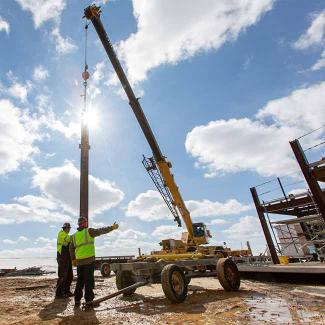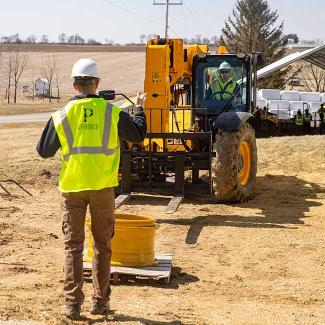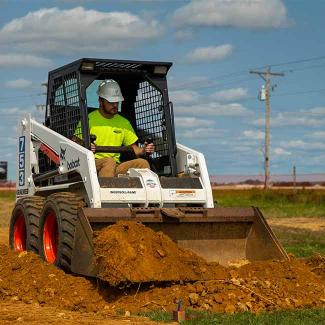UW-Platteville's Construction Management and Construction Safety Management programs have unique, hands-on, industry-driven laboratories available only to students enrolled in the construction capstone course.
The Construction Lab sits on a four-acre site that consists of two lab areas, a Commercial Construction Lab and a Road and Infrastructure Lab, located near Cooper Living and Learning Center, Pioneer Farm. These labs provide a unique atmosphere that combines teamwork with construction site problem-solving and communication. It exposes students to the different construction materials, how those materials are installed, and the stages of a project. It also gives students an understanding of weather conditions, project delays, conflicts, and time restraints in order to prepare students for their future roles in construction.
Equipment
See what makes UW-Platteville's lab unique

Grove Rough Terrain Crane
The crane is used to pick and set steel and lift other construction materials, giving students exposure to working around heavy equipment, rigging material, and setting materials on a live construction site.

Telehandler
The telehandler is used on every jobsite to lift material from location to location. Students in the Construction Management and Construction Safety Management programs gain exposure in working around equipment and rigging material and can become certified in the operation of the telehandler.

Skid Steer
Students in the programs will learn how to operate and work around the skid steer, one of the more common pieces of construction equipment.
Road & Infrastructure Lab
The Road and Infrastructure Lab sits on a two-acre site and provides students with exposure to heavy highway projects and infrastructures from engineer-designed plans. Students are exposed to common heavy highway practices such as survey, grading, earth moving, equipment safety, working around heavy equipment, equipment operation, earth and aggregate fill and placement, earth and aggregate compaction, earth retention systems, roadway construction, traffic control, erosion control, underground utilities, overhead utilities, sidewalks, concrete pavement, asphalt pavement, curb and gutter, and more.
The Road and Infrastructure portion gives students hands-on laboratory/field experience in basic site layout and problem-solving challenges through road and infrastructure construction projects, including but not limited to:
- soil grading and compaction techniques
- roadway and bridge construction
- overhead and underground utilities
- site drainage and site erosion control
- estimating, scheduling, traffic control, and construction heavy equipment safety training
The main goal of this class is to appreciate the importance of accuracy, implementation, and urgency of a construction-related task relative to the lab project schedule.
Commercial Construction Lab
The Commercial Construction Lab sits on a two-acre site and provides exposure to a two-story commercial building from architect and engineer-designed plans, allowing students exposure to common commercial and residential practices, such as plan reading and interpretation, construction phases and sequences, shop drawing creation and review, working around heavy equipment, equipment safety, building envelop, fabrication, welding, scaffolding, electrical, horizontal lifeline setups, plumbing, heating, cooling, propane, LP, precast concrete, and common construction tools.
Our Construction Capstone course is structured to expose students to a commercial construction and a road and infrastructure lab. The Commercial Construction Lab includes:
- construction phases/sequence
- shop drawing creation and review
- development of submittals
- basic fabrication
- hands-on commercial construction including steel erection of the superstructure, building envelope, mechanical, and electrical
- plumbing utilizing functional mockups
- complete disassembly of the structure
During the lab, the construction management students work with the construction safety management students to go over safety measures and what safety equipment is needed. Some of the safety equipment used include scaffolding, fall protection, set up of horizontal lifelines, and much more. Students get the opportunity to work with our crane to gain skills in rigging, signaling the crane operator, and critical picks.
Hands on learning
 |
Construction management students compete in national competition, place among top schoolsGretchen Bockenhauer A team of University of Wisconsin-Platteville construction management students recently traveled to Kissimmee, Florida, for the 2023 Construction Management Competition at the Associated Builders and Contractors Convention. |